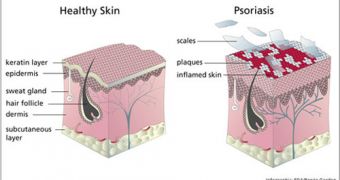The December issue of the Archives of Dermatology contains the report of recent researches taking place in Taiwan, where a team of specialists, lead by Dr. Yi-Ju Chen, have allegedly found a direct link between high levels of a hormone called leptin, especially in the blood of the patients suffering from psoriasis, and other severe metabolic disturbances, like obesity.
Scientists invited two distinct groups of people to take part in the study - 77 men and women diagnosed with psoriasis, and a control group of 81 persons, having the same age, gender, but presenting no signs of skin disease. For a period lasting about two years, scientists have gathered all the info necessary to their tests, concerning the subjects’ age, gender, weight, height, other diseases they were suffering from and the severity of psoriasis.
Their main interest was finding out if there was any difference, between the two groups, in the levels of leptin, a hormone connected to the immune, inflammatory processes going on in one's body, but also to the mechanisms of controlling the quantity of ingested food, the way fat is being stored, or the weight.
The results of the studies revealed that people suffering from psoriasis, besides presenting a higher level of leptin, were also likely to be obese, too. Analysis also demonstrated that they had high levels of glucose in their blood, some even suffering from diabetes, and that their blood-pressure was also abnormally high. The most affected seemed to be the women.
The good news would be targeting the overweight people who also suffer from psoriasis. The team of researchers also discovered that weight-loss triggers the levels of leptin to drop, and “improve insulin sensitivity and may reduce the likelihood of developing metabolic syndrome and adverse cardiovascular diseases,” says Dr. Chen.
"Body weight loss could potentially become part of the general treatment of psoriasis, especially in patients with obesity."

 14 DAY TRIAL //
14 DAY TRIAL //